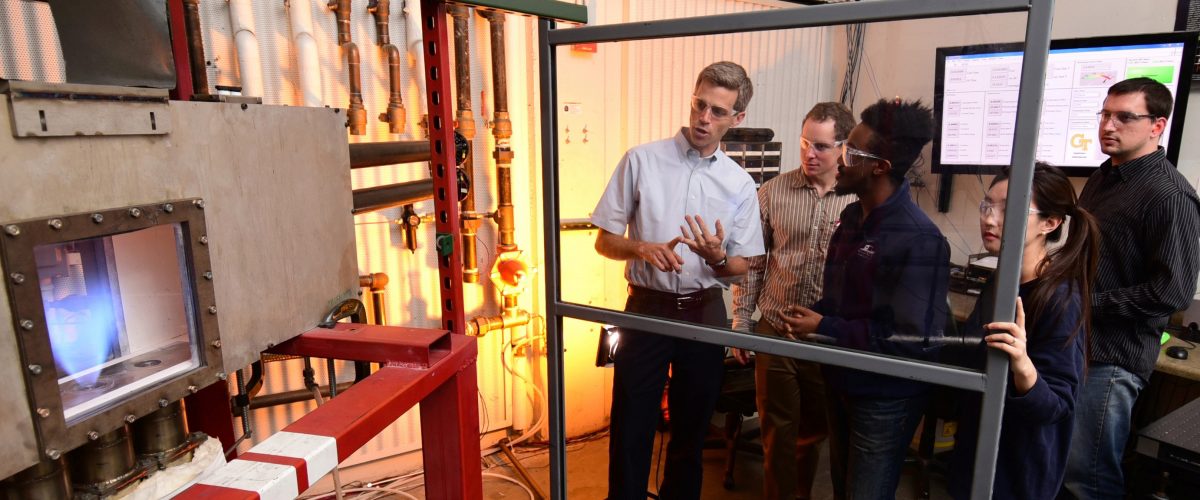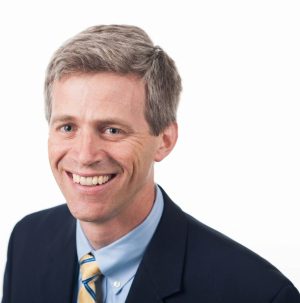 Research on Fire. The exemplary research and the passion that prompted ASME to recognize Prof.Timothy Lieuwen, far left, with yet another award all have their roots in the Ben T. Zinn Combustion Lab, where the longtime AE professor is a guiding presence.
Research on Fire. The exemplary research and the passion that prompted ASME to recognize Prof.Timothy Lieuwen, far left, with yet another award all have their roots in the Ben T. Zinn Combustion Lab, where the longtime AE professor is a guiding presence.
Aerospace engineering professor Timothy C. Lieuwen has been selected by the American Society of Mechanical Engineers to receive the 2018 George Westinghouse Gold Medal, a much-venerated honor within the field of power and energy generation.
Lieuwen will formally receive the medal during the ASME Mechanical Engineering Congress & Exposition, to be held this November in Pennsylvania.
 Prof. Timothy C. Lieuwen
Prof. Timothy C. LieuwenIn announcing the 2018 award, interim ASME director Phil W. Hamilton praised the longtime Georgia Tech professor for his "outstanding contributions to the development of clean power generation systems."
Vigor Yang, the chair of the Daniel Guggenheim School of Aerospace Engineering, echoed those sentiments.
"As a researcher and a thought leader, Tim Lieuwen has always exhibited the tenacity and vision that guarantee innovative results. The field of clean energy has already benefited enormously from his work on gas turbine combustion. We are glad that this award recognizes those contributions. "
A 2018 inductee of the National Academy of Engineering (NAE) and a 2010 Silver Westinghouse Medal recipient, Lieuwen currently serves as the executive director of Georgia Tech's Strategic Energy Institute, which brings together scientists, engineers, and scholars to develop game-changing strategies in clean energy production.
As a leader within AE's Ben T. Zinn combustion lab, Lieuwen has spearheaded research to improve the efficiency, dependability, and environmental friendliness of gas turbine-generated energy.
"We've been doing a lot of work on how alternative fuels affect energy generation," he said. "There's a lot of interest in using gas turbines that are fuel-flexible -- that is, able to use fuels that have fewer emissions. But the low-emission combustors can be very finicky -- subject to blow-outs and combustion instabilities. We've been able to do some good work in that area. The standard model that turbine manufacturers use to predict instabilities was developed by our lab."
Lieuwen has authored or edited four combustion books, including the textbook Unsteady Combustor Physics, eight book chapters, 110 journal articles, and more than 200 other papers. He has received five patents and is a member of the National Petroleum Counsel and has served on the board of ASME's International Gas Turbine Institute, and as a past chair of ASME's Combustion, Fuels, and Emissions technical committee..
Asked to comment on his latest honor, Lieuwen immediately pointed to the work of his colleagues in the Zinn lab and at SEI.
"This has to be seen as recognition for the commitment and hard work of a team of dedicated individuals, people who are working every day to overcome all challenges to the production of cleaner energy," he said. "I am honored to work with that team."